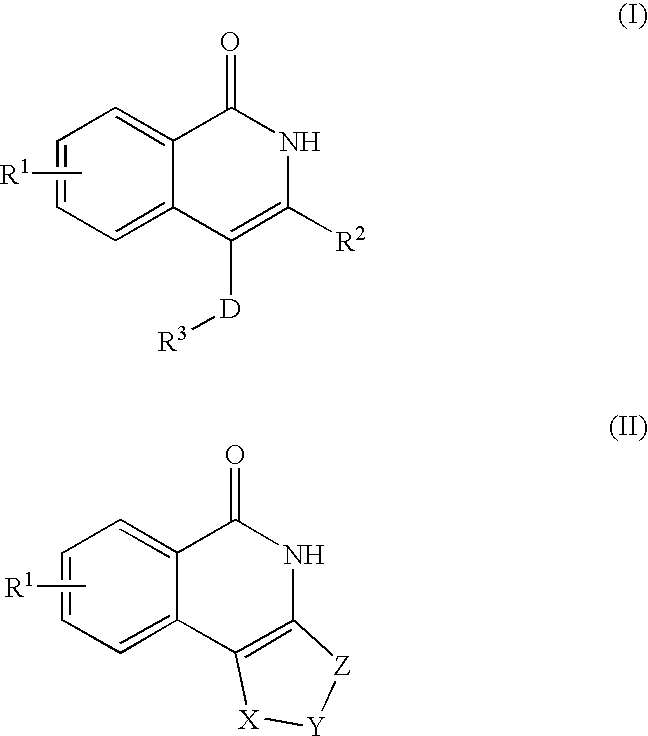Isoquinoline compounds and medicinal use thereof
a technology of isoquinoline and compound, which is applied in the field of new drugs, can solve the problems that none of the reported parp inhibitors to date has been subjected to clinical trials as a therapeutic agent for cerebral infarction, and none of these compounds takes note of parp inhibitory activity
- Summary
- Abstract
- Description
- Claims
- Application Information
AI Technical Summary
Benefits of technology
Problems solved by technology
Method used
Image
Examples
example 1
[0763] 3-Amino-2H-isoquinolin-1-one (9.0 g), dimethylglycine hydrochloride (10.2 g) and pyridine (22.7 mL) were suspended in methylene chloride (100 mL), and 2-chloro-1,3-dimethylimidazolinium chloride (12.4 g) was added under ice-cooling. Then the mixture was stirred at room temperature for 2 hrs. After the completion of the reaction, the reaction mixture was dissolved in a mixed solvent (chloroform and lo methanol 10:1), washed with aqueous potassium carbonate solution and the organic layer was dried over magnesium sulfate. The solvent was evaporated, and the obtained residue was purified by silica gel column chromatography. The fraction eluted with chloroform:methanol was concentrated, and the precipitated crystals were collected by filtration to give 3-amino-4-(2-(dimethylamino) acetyl)-2H-isoquinolin-1-one (5.5 g). This compound was dissolved in chloroform-methanol mixed solvent, and 4N hydrogen chloride-dioxane was added. The precipitated crystals were collected by filtration,...
example 2
[0765] 3-Amino-4-(2-(piperidin-1-yl)acetyl)-2H-isoquinolin-1-one (0.3 g) was obtained by the reaction in the same manner as in Example 1 using 3-amino-2H-isoquinolin-1-one (0.8 g) and (piperidin-1-yl)acetic acid hydrochloride (0.79 g). [0766]1H-NMR (DMSO-d6) δ: 1.31-1.54 (6H, m), 2.41-2.53 (4H, m), 3.34 (2H, s), 7.18 (1H, t, J=7 Hz), 7.54 (1H, t, J=7 Hz), 7.99-8.03 (3H, m), 8.28 (1H, d, J=8 Hz), 10.97 (1H, brs). MS(EI): 285(M+).
example 3
[0767] 3-Amino-4-(2-(dimethylamino)acetyl)-5-methyl-2H-isoquinolin-1-one (0.2 g) was obtained by the reaction in the same manner as in Example 1 using 3-amino-5-methyl-2H-isoquinolin-1-one (0.87 g) and dimethylglycine hydrochloride (0.91 g). [0768]1H-NMR (DMSO-d6) δ: 2.12 (6H, s), 2.23 (3H, s), 3.15 (2H, s), 7.16 (1H, t, J=8 Hz), 7.24 (2H, brs), 7.44 (1H, d, J=7 Hz), 7.88 (1H, d, J=8 Hz), 10.86 (1H, brs). MS(EI): 259(M+).
PUM
| Property | Measurement | Unit |
|---|---|---|
| temperature | aaaaa | aaaaa |
| temperature | aaaaa | aaaaa |
| temperature | aaaaa | aaaaa |
Abstract
Description
Claims
Application Information
 Login to View More
Login to View More - R&D
- Intellectual Property
- Life Sciences
- Materials
- Tech Scout
- Unparalleled Data Quality
- Higher Quality Content
- 60% Fewer Hallucinations
Browse by: Latest US Patents, China's latest patents, Technical Efficacy Thesaurus, Application Domain, Technology Topic, Popular Technical Reports.
© 2025 PatSnap. All rights reserved.Legal|Privacy policy|Modern Slavery Act Transparency Statement|Sitemap|About US| Contact US: help@patsnap.com



